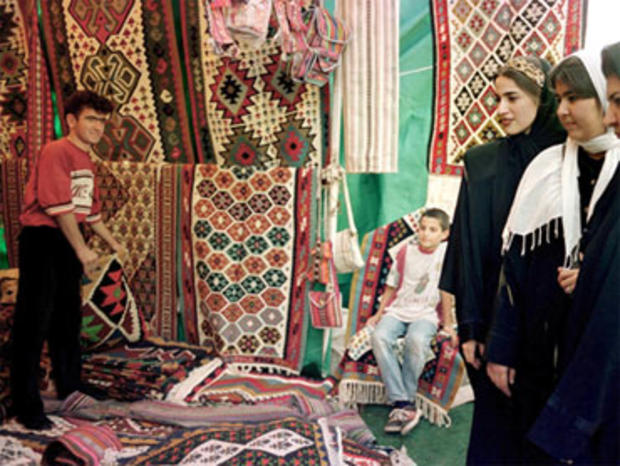Iran: Persian Rug Industry Unraveling
This story was written by GlobalPost's Jason Rezaian
TEHRAN, Iran - For decades Americans have been going to their neighborhood Persian rug shop to sift through the piles upon piles of hand-woven carpets, meticulously finding the right one for their homes.
Now, however, that luxury, and its market, is under attack.
As U.S. sanctions against Iran begin to take hold, no longer will the colorful carpets, which almost all come from Iran, be able to enter the United States. And while this means American homes might end up a little less decorative, for Iranians the ban will have a much more dire effect.
Rug exports account for about $500 million in revenue for Iranian dealers every year. The United States, it's top client, provided about 20 percent of that revenue until late September, when the embargo took hold.
The government estimates that 5 million Iranians are somehow connected to the production and distribution of handmade rugs, making it one of the country's most important industries. The impact on the livelihood of such a large number of people is difficult to quantify, but Iranians say it is yet another example of how they are being unfairly targeted by the latest round of international sanctions imposed on their country.
"We're wondering why the American government would do this," said Mohammad Mehdizadeh, a rug trader from the city of Kerman, one of Iran's oldest weaving centers. "These sanctions will only affect people in the trade. What connection does the rug business have with politics?"
The Iranian public, reeling from a worsening economic climate, is increasingly asking this question of President Barack Obama. The total amount of lost trade from all the goods banned under the sanctions, including rugs, represents more than $62 million, according to the International Monetary Fund.
At the 19th annual International Handmade Carpet Exhibition, which opened in Tehran in September, those involved in the carpet trade were apprehensive about the future of their industry.
The importation of Iranian rugs and other so-called luxury goods into the United States had been banned for most of the 1980s and all of the 1990s with very limited success as the rugs still managed to enter the country through Canada.
"I actually sent rugs during Reagan's time illegally. We'd send them to Germany, and then to Canada. From Canada they would be loaded on to small trucks and taken over the border at night," Mehdizadeh said.
But this time around, with Canada and other U.S. allies also taking part in, and complying with, the sanctions, Persian rugs are unlikely to again find their way over the border any time soon.
In an apparent goodwill gesture in 2000, during the final months of the administration of President Bill Clinton, an exemption was made for Iranian rugs, pistachios, caviar and dried fruit, which led to a rush by many Iranian rug merchants in both the United States and Iran to fill the longtime void. The market was quickly saturated and large stocks of unsold rugs still remain in warehouses throughout the United States.
Dealers in America had been expecting such a move for some time, and many are hoping that, at least in the short-term, the perception of scarcity might help increase demand. In fact, many rug dealers in the United States, anticipating the sanctions, increased their orders before the embargo went into effect.
A dealer from the northern Iranian city of Tabriz, who asked not to be named, said that exports to the United States over the summer had been brisk but that he is becoming concered about the future of the industry.
"If we can't send them out of the country, how can we survive? When we have good relationships with other countries we can export easily, if we can't, obviously our industry will suffer and at this point only God knows when things will improve," he said.
